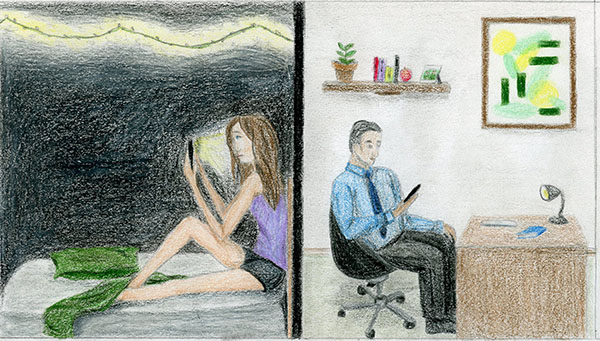Text-A-Tip provides emotional support

Illustration by Ala Jankowski
March 21, 2017
District 225 has partnered with Linking Efforts Against Drugs (LEAD) to provide a 24/7 anonymous text hotline called Text-A-Tip for students at the Glenbrooks.
According to Andy Duran, the executive director for LEAD, they decided to create the service to uphold their goal of offering mental health support for communities such as Glenview.
“It became very clear that students wanted to have a way to reach out in real time via means that they were comfortable with, in this case, texting,” Duran said.
According to Principal Lauren Fagel, all texts are responded to within minutes by a licensed mental health professional from LEAD, who has experience working with youth.
“Counselors, administrators and the licensed professional are unable to trace names or phone numbers, so students can feel absolutely safe reaching out for the help they need,” Fagel said.
Students can text “GBS Help” and their message to 844/823-5323 or download the Text-A-Tip application from iTunes or Google Play. Either way, students will receive a prompt response providing further guidance and support. Although Text-A-Tip has been implemented, the Titan Anonymous Concern Hotline is still an available resource for students. Fagel says that Text-A-Tip is primarily used for oneself, whereas the Titan Anonymous Concern Hotline is usually for reporting concerns about others.
“We care deeply about [students’] safety, security and well-being,” Fagel said. “We want [students] to know that help is available to them anytime, simply from the touch of [their] phones.”
Because of Text-A-Tip’s anticipated success, District 225 asked District 34, which serves grades PreK-8, to also consider using Text-A-Tip. Dr. Mike Riggle, District 225 superintendent, advocates for its implementation in District 34 schools to familiarize students with the service; however, a decision has yet to be made by the administration.
“[Text-A-Tip] is going to be a service that they’ll become used to […] and see as a resource,” Riggle said. “They don’t have to learn a new system and question that system when they enter high school.”
According to LEAD, the ultimate goal is to provide an outlet for youth to voice their concerns about either themselves or someone else, as to help foster a safer and healthier community.


